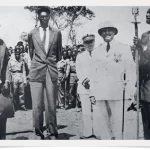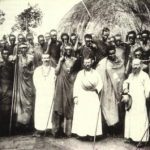Gisaka, the Church, and the Court
The Court had been all the more anxious to settle the Njangwe case because at this time it was being faced with serious unrest in Gisaka. In 1897 Ramsay had remarked on the hostility between Rwandan rulers and the people of Gisaka, predicting that if Rwandan policy toward Gisaka did not change, the area might well revolt. Bishop Hirth, traveling through the same region in October 1900, also described how the people of Gisaka were suffering from exploitation by many Rwandan notables who had arrived to live off the region. At the time of his journey, inadequate rainfall and the resulting scarcity of food were contributing to the general discontent.
The leader of the nascent revolt, a man named Rukura, tried to rally the dissatisfied to his cause by claiming to be descended from Kimenyi IV Getura, the last great king of Gisaka. Although his claim was probably unfounded, a growing number of the people of Gihunya province (The former kingdom of Gisaka was formed of three semi-autonomous provinces: Mirenge, Gihunya, and Migongo. In November1900 the White Fathers had established a mission at Zaza in Mirenge (die western-most of the three provinces). Gihunya was the central province) were willing to accept him as a “mwami.”He was apparently also supported by some Barundi, including Cyoya, the main instigator of raids by Barundi into Bugesera, the province that adjoins Gihunya. In Gisaka, Rukura had become allied with an American trader named Spears, but also called by the Swahili name of Bwana Mzee [Mr. Old Man]. Spears, whose illegitimate trading activities were opposed by the Rwandan Court, may have hoped for the establishment of an autonomous Gisaka where he would have greater freedom to carry on his business. In 1897 Rukura, already hopeful of winning power in Gisaka, had persuaded a German officer to give him a letter authorizing him to rule there as a subordinate of the Rwandan mwami.
Realizing that Rukura might once more enlist the protection of the Germans, the Court sought help from Kandt. Kandt agreed that Rukura must not be allowed to sever Gisaka from Rwanda and advised the Court to seek the aid of the White Fathers as well. In late September 1900 Ruhinankiko, the most powerful man at Court, and the nephew Rwidegembya, whose influence was fast growing, appeared at Save to request the protection of the missionaries for the Court Ruhinankiko was most concerned since the uprising was centered in Gihunya, which was under his own command. The Fathers, considerably disturbed by the as yet unsettled Njangwe case and by the recent pillage of one of their caravans in Gisaka, refused the Court’s request that they write to the governor of German East Africa asking him to prevent Rukura from taking control of Gisaka. Their decision reflected not only anger at the Court but annoyance with Kandt as well, who they believed sided too much with the Court. The Court, unaware of how greatly the Fathers differed with Kandt, believed that the missionaries had refused to support it onlybecause they were displeased with the Court’s handling of the Njangwe and pillage cases. The Fathers reinforced this impression by lecturing Ruhinankiko and Rwidegembya on the need for prompt action in these affairs.
Discontent in Gisaka abated somewhat at the end of 1900. But the Court had learned a lesson: relations with the Fathers must be improved in case the revolt should flare up once more. Beginning in October 1900, the Father Superior noted in his diary that the Court seemed “better disposed” to the mission and had ordered that it be supplied with much needed building materials. Several months later the Fathers were permitted to install their leading catechist at Nyanza, where he was to teach secular les sons to the notables. Soon the catechist was even being questioned at Court about religion. At Save itself, the Father rejoiced that there was a “great movement of conversion” taking place on all the neighboring hills. In January 1900 the mwami announced that he wished his people to take instruction, a sentiment the local notables promptly echoed. The Father Superior reported that approximately three thousand postulants, mostly Hutu but including some Tutsi, had learned the basic tenets of the faith. But even in their rejoicing, the Fathers wondered if the movement showed the sincere desire to convert or simply an obedience to royal orders. Whereas those who had first visited the mission had trusted the Fathers with their children, these later visitors were mostly adults who hid their children from the missionaries. It seemed that although these men had no choice but to take instruction themselves, they feared exposing their children to “Nina rufu” [Nyina urupfu, Mother Death], who was said to live at the mission and to subsist on a diet of Rwandan children.
In March 1901 Rukura and about one hundred followers, most of whom were Baganda, began to cause serious disruption in Gisaka. Most of the Tutsi of the Abarasa regiment, who were natives of the Gisaka province of Gihunya, decided to support him. Seeking the protection of the White Fathers, who, shortly before, had founded a mission in Gisaka at Zaza, Rukura showed them the three-year-old letter from the German officer naming him to command Gisaka. Rukura claimed, however, that the letter authorized him to rule the region independently, not as a subordinate of the Rwandan mwami. The Father Superior at Zaza, refusing to recognize the authorization, advised rukura to leave the area since several Rwandan regiments were already in Gisaka and were preparing to attack him. Discouraged at the refusal of aid from the Fathers and intimidated by the prospect of a battle with the royal regiments, Rukura retreated across the border into Bushubi (Bushubi was an independent kingdom east of what is now Burundi and southeast of Rwanda; in 1901 Rukura was captured there and imprisoned by the Germans. After his subsequent release, he did not attempt any further incursions into Gisaka.). Fearing reprisals for their support of the rebel, most of the leaders of the Abarasa regiment fled to Burundi, taking with them several thousand of their cattle. Since the retreat was effected quickly, only the rear guard of the rebels actually engaged with the advancing Rwandan troops.
In May the German officer lieutenant von Grawert was still concerned enough about discontent in Gisaka to make a show of force in the region. Arriving from Bujumbura with a contingent of troops, he traveled around Gisaka ordering the people of the region to obey the Rwandan Court. Whether the Court specifically requested this expedition is unclear, but it certainly welcomed the expression of German support. While in Gisaka, von Grawert arrested the trader Spears, obliged him to make restitution for ivory and cattle that he had taken more by force than by rightful trade, and expelled him from Rwanda. Von Grawert also conducted a punitive expedition against Cyoya, who had been successfully raiding cattle in Bugesera. The German officer confiscated more than a thousand cattle from him, one-third of which he kept for the government and two-thirds of which he presented to Musinga.
The Court was very pleased with the simultaneous settlement of these three problems in southeastern Rwanda. It believed that the support the Fathers had refused in September but granted in March had been essential in turning back Rukura and causing the Germans to intervene. Satisfied with the outcome of its policy of good relations with the Fathers, it sent messages of thanks to Save and Zaza; to the Zaza Fathers, whose help had been most crucial, it also sent an ivory tusk and a cow.
https://uk.amateka.net/gisaka-the-church-and-the-court/https://uk.amateka.net/wp-content/uploads/2022/11/amateka-idini.jpghttps://uk.amateka.net/wp-content/uploads/2022/11/amateka-idini-150x150.jpgMissionary historyThe Court had been all the more anxious to settle the Njangwe case because at this time it was being faced with serious unrest in Gisaka. In 1897 Ramsay had remarked on the hostility between Rwandan rulers and the people of Gisaka, predicting that if Rwandan policy toward Gisaka...BarataBarata rpierre@ikaze.netAdministratorAMATEKA | HISTORY OF RWANDA



